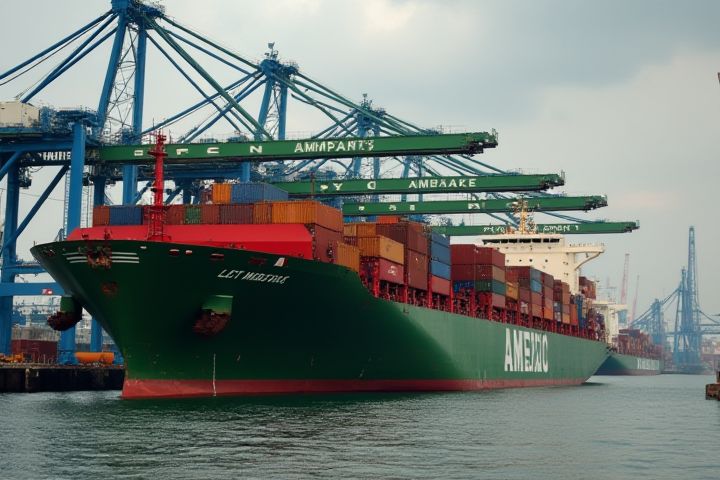
Nigeria's economy is heavily influenced by its import and export activities, particularly in sectors like oil, agriculture, and manufacturing. As one of Africa's largest oil producers, crude oil remains the country's primary export, significantly contributing to national revenue. In contrast, Nigeria relies on imports for machinery, vehicles, and food products, impacting the trade balance and exchange rates. Recent efforts to diversify the economy have led to an increase in the export of non-oil products, such as cocoa and rubber, enhancing potential growth avenues. Understanding these dynamics is essential for anyone looking to engage in trade or investment opportunities in Nigeria.
Oil and gas dominance
Nigeria's economy heavily relies on the oil and gas sector, which constitutes a significant portion of its export revenue, with crude oil accounting for over 90% of total exports. The country is one of Africa's largest oil producers, leveraging its vast reserves in the Niger Delta region to attract foreign investment and partnerships. Major international oil companies, such as Shell and Total, operate extensively in Nigeria, contributing to the development of infrastructure and local service industries. For those interested in engaging with Nigeria's trade landscape, understanding the intricate dynamics of oil and gas supply chains is crucial for navigating opportunities and challenges.
Diverse agricultural exports
Nigeria's import and export landscape significantly revolves around its rich agricultural sector, which contributes extensively to the economy. Prominent agricultural exports include cocoa, cassava, yams, and palm oil, showcasing the nation's diverse agronomic capabilities. The agricultural export market not only bolsters foreign exchange earnings but also enhances food security by promoting local farming initiatives. By investing in sustainable practices and improving infrastructure, you can contribute to the growth of Nigeria's agricultural export potential.
Trade agreements
Nigeria's import and export activities are significantly shaped by various trade agreements aimed at boosting economic growth and facilitating cross-border commerce. The African Continental Free Trade Area (AfCFTA) plays a crucial role in eliminating tariffs on intra-African trade, providing Nigerian businesses with greater access to regional markets. Bilateral trade agreements with countries such as the United States and China also enhance Nigeria's export capacity, particularly in sectors like oil, agriculture, and textiles. Understanding these trade frameworks can help you navigate opportunities in international markets and optimize your business operations.
Customs regulations
Nigeria's import and export activities are heavily regulated by the Nigeria Customs Service (NCS), which enforces compliance with tariffs and trade laws. Understanding customs regulations is essential for businesses engaged in international trade, as these rules dictate the necessary documentation, duties, and taxes for goods entering or leaving the country. The regulations also emphasize adherence to policies that prevent the importation of prohibited items and promote trade facilitation, ensuring a smooth customs clearance process. Familiarizing yourself with NCS guidelines can significantly enhance your operational efficiency and minimize delays in the import-export process.
Export incentive schemes
Nigeria's export incentive schemes aim to enhance international trade by providing financial benefits and support to exporters. These programs, including the Export Expansion Grant and the Export Development Fund, are designed to boost the competitiveness of Nigerian goods in global markets. By offering tax rebates, grants, and non-fiscal incentives, these initiatives encourage both local manufacturers and agribusinesses to increase their export volumes. You can take advantage of these schemes to gain a larger share of the global market while contributing to Nigeria's economic growth.
Import restrictions
Import restrictions in Nigeria play a crucial role in regulating the flow of goods into the country, aiming to protect domestic industries and promote local production. The Nigerian government enforces a range of tariffs and import bans on specific products, including textiles, electronics, and agricultural products, to encourage local entrepreneurship and reduce reliance on foreign goods. Compliance with the import documentation process, including the Pre-Arrival Assessment Report (PAAR), is essential for businesses looking to navigate the regulatory landscape successfully. Understanding these import restrictions can significantly impact your investment strategy, ensuring that your operations align with national trade policies and support the local economy.
Infrastructure challenges
Nigeria's import and export sectors face significant infrastructure challenges, impacting overall economic growth and trade efficiency. Poor transportation networks, including inadequate road, rail, and port facilities, hinder the smooth movement of goods, leading to delays and increased costs for businesses. Electrical outages and insufficient power supply further complicate logistics, making it difficult for companies to maintain productivity and reliability. Addressing these infrastructure deficits is crucial for enhancing Nigeria's global trade competitiveness and facilitating seamless international transactions.
Currency fluctuations
Currency fluctuations significantly impact Nigeria's import and export activities, affecting trade balances and economic stability. The depreciation of the Naira can make imported goods more expensive, leading to increased costs for businesses and consumers alike. Conversely, a stronger Naira can boost export competitiveness by lowering the price of Nigerian goods in international markets. Understanding these currency trends is essential for businesses engaged in international trade, as they navigate price volatility and adjust their market strategies accordingly.
Port congestion
Nigeria's import and export activities are significantly impacted by persistent port congestion, particularly at major entry points such as Lagos and Onne ports. The congestion not only delays the movement of goods but also increases transportation costs, affecting supply chain efficiency. This situation arises from inadequate infrastructure, inefficient customs procedures, and a high volume of cargo traffic, challenging the timely clearance of imports and exports. Addressing these issues is crucial for optimizing trade flow and enhancing economic growth in the region.
Non-oil export promotion
Nigeria's non-oil export sector has become a vital component of its economy, showcasing agricultural products such as cocoa, cashew nuts, and sesame seeds as key export commodities. The government has implemented various initiatives to enhance export capabilities, including improving infrastructure, providing financial incentives, and facilitating access to international markets. By focusing on non-oil exports, Nigeria aims to diversify its revenue sources and reduce dependency on oil, thereby fostering economic stability. Engaging with non-oil businesses can open opportunities for you in global trade networks and contribute to sustainable development in the region.
